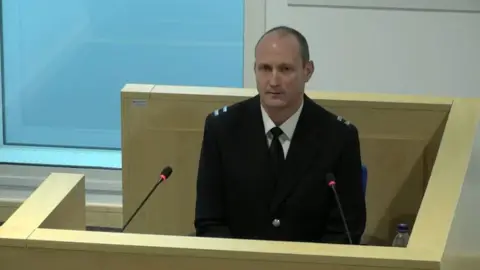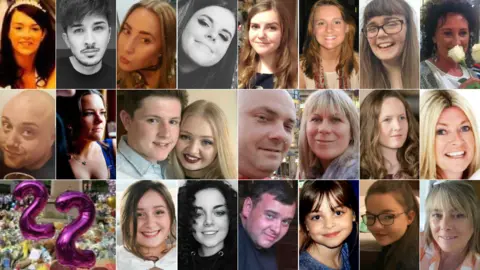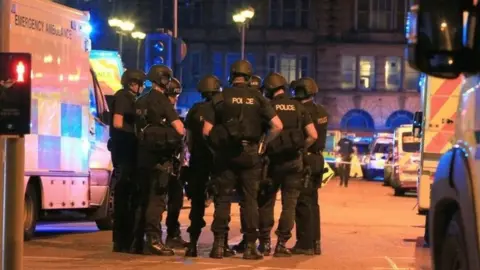Manchester Arena attack: Fire bosses 'risk-averse' over bombing
 Manchester Arena Inquiry
Manchester Arena InquiryFire crews should have gone straight to the Manchester Arena bombing scene rather than a rendezvous point three miles away, a public inquiry has heard.
In a debrief, crew manager Nicholas Mottram urged Greater Manchester Fire & Rescue Service (GMFRS) bosses to "stop being so risk-averse".
Firefighters joined the service to save lives "not stand back and let people suffer or die," he added.
It took two hours for the first fire engine to reach the arena.
Twenty-two people were killed and hundreds more injured when Salman Abedi detonated a bomb at the end of an Ariana Grande concert on 22 May 2017.
Mr Mottram said the first he heard about the explosion was in a mobile phone call from his paramedic wife, Helen, who told him she was heading straight to the Arena.
In contrast, he was ordered by his bosses to meet three miles away at Philips Park fire station.
'No urgency'
Mr Mottram said he was at Philips Park when his wife phoned him again to say there were several fatalities and some 60 casualties from what appeared to be shrapnel injuries.
 Family handouts
Family handoutsAsked how that made him feel, he replied: "Very frustrated that we were not there as well.
"We seemed to have a lack of information and we seemed to be in the wrong location."
The hearing was told that, in a GMFRS debrief in July, Mr Mottram wrote: "I can honestly say I can't think of any aspect of the incident that went well."
He agreed he felt "embarrassed and ashamed" and called on senior fire officers to consider the moral obligation to the public not just "policy and procedure".
"If the police and ambulance had waited as long as the fire and rescue service then there may have been a greater number of deaths," he said.
He said his colleagues could have set up an incident command-style system at the arena and assisted paramedics with evacuating casualties to a triage area with "proper equipment" rather than hoardings.
 Manchester Arena Inquiry
Manchester Arena InquiryMr Mottram told John Cooper QC, representing the bereaved families: "I would say we are more risk-averse then we used to be when I joined the service."
Asked by Mr Cooper whether he felt firefighters had been held back by protocols, he said: "That's how it appeared, yes."
'No urgency'
GMFRS watch manager Neil Helmrich, based at Philips Park on the night, told the inquiry that apart from one fellow watch manager "none of the officers who had any other control of the incident demonstrated to me that they were desperate to get to down to the incident".
He said: "In normal circumstances if we are mobilised to an incident - the lights go, the bells go...there is a lot of impetus and urgency and you know you are going to deal with the incident.
"For this incident, there was no impetus or urgency from any of the officers in attendance."
When his crew was eventually mobilised to the arena Mr Helmrich said they were "quiet".
"We understood we wouldn't be assisting many people at this stage," he said.
 PA Media
PA MediaHe told the inquiry there was pressure on incident commanders to stick to policies and procedures if they wanted to advance and progress their career.
"It's left lots of incident commanders in a position where they can't see what is absolutely in front of them," he said.
He agreed with Mr Cooper that leadership was "sorely lacking" on the night.
The inquiry continues.

Why not follow BBC North West on Facebook, Twitter and Instagram? You can also send story ideas to [email protected]
